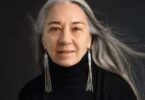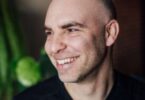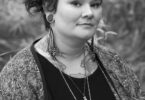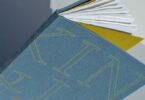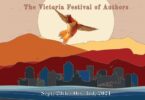Interview by L’Amour Lisik
In connection with this year’s Victoria Festival of Authors taking place September 29 to October 3, Plenitude prose editor L’Amour Lisik interviews VFA panelist Hasan Namir on his latest collection of poetry, Umbilical Cord. Birth, Death, the Restlessness In Between takes place Friday, October 1, and Hasan will be participating in the panel alongside Andrea Actis and Jen Sookfong Lee.
Hasan Namir is an Iraqi-Canadian author. He is the author of three previous books: God in Pink, winner of the Lambda Literary Award for Best Gay Fiction, War/Torn, recipient of the 2020 Barbara Gittings Honor Book Award from the Stonewall Book Awards, and the children’s book, The Name I Call Myself. Hasan lives in Vancouver with his husband and child.
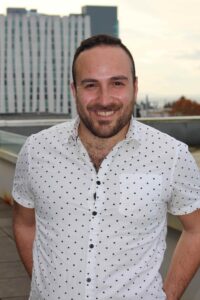 Your panel for the Victoria Festival of Authors is titled “Birth, Death, the Restlessness In Between,” and includes poets Andrea Actis and Jen Sookfong Lee, with moderator John Barton. There are nine other events happening for the festival between September 29 and October 3. Are there any that you’re especially excited about?
Your panel for the Victoria Festival of Authors is titled “Birth, Death, the Restlessness In Between,” and includes poets Andrea Actis and Jen Sookfong Lee, with moderator John Barton. There are nine other events happening for the festival between September 29 and October 3. Are there any that you’re especially excited about?
I’m just really excited to be on the same panel as Jen Sookfong Lee and Andrea Actis! Been looking forward to this for a while now!
Your poetry book Umbilical Cord follows a somewhat chronological timeline as your baby, Malek, is conceived, birthed, and raised lovingly by you and your husband Tarn. Punctuated throughout are “Dear Child” poems—open letters to Malek that mark the stages of his growth from teething to talking. How did you settle on this layout? Did you write the poems of Umbilical Cord as the events were happening, or afterwards, in retrospect?
I’ve had this layout from the very beginning. I knew I wanted to include the “Dear Child” poems throughout the book. A lot of the poems in the book were written as it happened, except for the neonatal intensive care poems because I didn’t have access to a laptop at the hospital so the poems were written after I left the hospital. I took a year off from work and I spent all these days with Malek so a lot of the poems were written as I was inspired to write them.
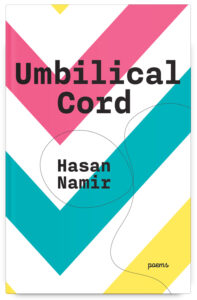 You write “Dear Child, / We dreamed of your birthday / A big celebration in a hall / Surrounded by our family and loved ones / We were in a pandemic / The air around us changed all that.” What was it like to write these poems and raise a baby during the uncertainty of this pandemic?
You write “Dear Child, / We dreamed of your birthday / A big celebration in a hall / Surrounded by our family and loved ones / We were in a pandemic / The air around us changed all that.” What was it like to write these poems and raise a baby during the uncertainty of this pandemic?
It has been challenging for sure because there were a lot of uncertainties, even this year as we’re planning his second birthday, we’re not sure what’s going to happen, so we’re definitely more cautious and seeing how things are. I will say that the pandemic and the lockdown did give me opportunities to write more so I had a lot of time to write poetry because we spent a lot of time at home. There were a lot of things that we wanted with Malek, a lot of activities but we couldn’t as much because we were scared and we were looking out for his health. This year was easier for sure as a lot of the restrictions were lifted as more people are being vaccinated. I definitely have a lot of stories to share with Malek once he’s old enough about the pandemic. I’m grateful for everything though. We are not the only parents that are raising a child through the pandemic and we’re just taking it one day at a time.
Your book blends poetry with nonfiction, weaving in segments from your own childhood, memories of your parents, and hopes for the future. You also write fiction, with your debut novel God in Pink winning a Lambda Literary Award for Gay Fiction. Does your fiction writing inform your poetry and vice versa? What advice would you give to emerging writers looking to publish their first book of fiction or poetry?
My fiction writing has inspirations from my own personal life, but the stories and characters are also very different. There are similarities but the differences are more significant for sure. I find poetry gives me that space of comfort so I’m able to share my personal stories more than fiction. As a writer, I like that versatility that allows me to switch genres and forms and be able to tell my stories differently without being trapped into one type of literary platform. I enjoy having to navigate through fiction, poetry, children’s picture books. My advice for emerging writers is to write what you know, tell your own stories because we are longing for these diverse stories and stay determined and hopeful. Don’t let a rejection crush your dreams. Keep following your dreams and never give up. Also, independent book publishers are always looking for amazing books, so submit your manuscripts to them once you know it’s ready for publication.
What are you reading and/or writing right now? When you were writing Umbilical Cord, were there particular queer, Iraqi-Canadian, and/or BIPOC authors who you looked to for inspiration?
Currently reading With/Holding by Chantal Gibson, a wonderful poetry book that I recommend to everyone. I was inspired by Adrienne Gruber’s wonderful poetry book Q&A, so I wanted to write a family poetry book about my own personal experience. There aren’t a lot of queer family poetry books, if any, so, I hoped that Umbilical Cord opens that door and I hope to see more poetry books and books in general giving queer families platforms.
…
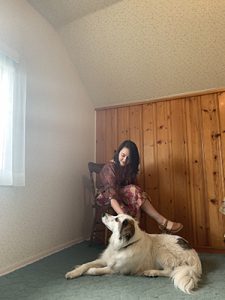 L’Amour Lisik is an artist, writer, and QPOC who lives on the unceded traditional territories of the Lekwungen and W̱SÁNEĆ Peoples. She holds a BFA in Writing from the University of Victoria, where she focused on poetry and creative nonfiction. She works as managing editor for The Malahat Review.
L’Amour Lisik is an artist, writer, and QPOC who lives on the unceded traditional territories of the Lekwungen and W̱SÁNEĆ Peoples. She holds a BFA in Writing from the University of Victoria, where she focused on poetry and creative nonfiction. She works as managing editor for The Malahat Review.

